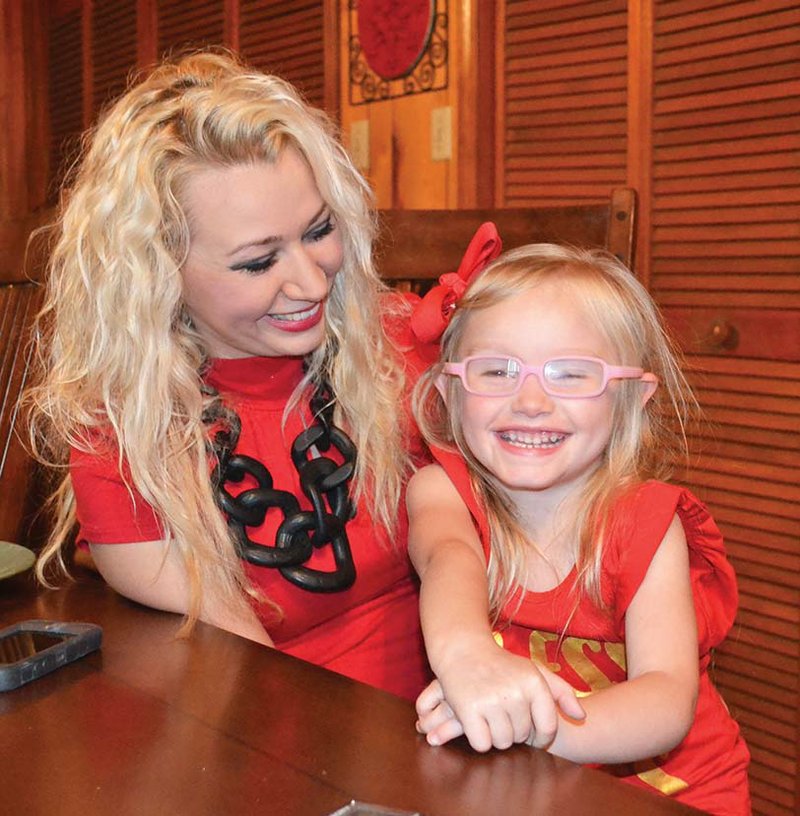When Jami Allen of Russellville gave birth four years ago to her daughter, Adora, she immediately knew something was wrong.
It was not what Allen saw or heard that frightened her. It was what Allen did not hear.
“I never heard her cry,” Allen recalled. “I knew that when you have a baby, the first thing you are supposed to hear is crying.”
The birth of Allen’s daughter, Adora, followed what Allen described as “very, very traumatic labor.”
Allen, 28, said Adora “was turned the wrong way and also had the [umbilical] cord around her neck.” Adora’s heart rate began to decrease, and an emergency cesarean section was performed.
“I think my body was still in shock [from the C-section], but I was still worried about her when I didn’t hear her cry.”
When the pediatrician came in a few moments later, he said a helicopter was on its way. Adora was having seizures, he told Allen, and her daughter was being taken to Arkansas Children’s Hospital in Little Rock. Adora was transported before Allen got a chance to hold her.
While Allen was still hospitalized in Russellville, she received a call telling her that Adora had suffered a stroke.
“When they called, they said they were not sure about her survival because on the MRI, the whole right side of her brain was gone, and there was a little spot on the left side.”
At the time, Allen had no idea that children, including infants, could have strokes.
“When I heard that she had a stroke, I thought, ‘That’s for older people, not my baby,’” she said.
Allen then began the process of educating herself about pediatric strokes and found a valuable resource in the Children’s Hemiplegia and Stroke Association, more commonly known by its acronym, CHASA.
That is when Allen began her effort to raise community awareness about childhood strokes.
“I want other people to know about this,” she said, noting that even unborn children can have strokes.
Citing statistics from the association, Allen said a stroke occurs once in 2,800 births, and it can occur in children.
“I just want parents to be informed about the symptoms so they can catch it immediately,” she said.
In addition to the general awareness of pediatric stroke, Allen wants to help raise money for research. Right now, about 99 percent of all funding for stroke research is allocated toward the study of adult strokes, she said.
“In most cases, the reason for pediatric stroke is unknown,” Allen said. “There needs to be more research. We need more funding because we need to know what causes this. We need to know how it can be prevented.”
Allen, who has been active in a number of fundraising activities for various causes in the past, recently put together an event specifically about pediatric-stroke awareness. The event was held in late May at her own business, the As You Wish by Jami and Sarah Inc. special events center in Pottsville.
All proceeds from the event were donated to CHASA.
“We want to make it an annual event. We started out small because this was the first time, but I knew I wanted to do something to help raise awareness in the community,” she said.
“After what we have been through,” Allen said, “if I can help benefit anyone by making them more aware about
pediatric stroke, then that’s what I want to do.”
Children who have had pediatric strokes often develop stroke-related disabilities. In Adora’s case, those have included cerebral palsy and epilepsy. As Adora gets older, attention-deficit disorder and behavioral problems may develop, along with vision and hearing problems, sensory and cognitive differences, and others, Allen said.
“Right now it is kind of a wait-and-see type of thing” in terms of what issues may develop, Allen said. In addition to her daily therapy regimen, Adora attends a developmental day center during the week. Her therapy regimen began when she was 3 months old. It has continued, and Adora has some type of therapy every weekday, including physical, occupational and speech therapy. In the spring, Adora began hippotherapy, which uses horses to help children with balance.
Allen had previously volunteered for a couple of years at Equestrian Zone, where Adora has her hippotherapy. Allen also worked in the district court system for several years, and as a result of those experiences, she said, “I really had my heart set on working with people with disabilities. I didn’t know I was going to have [a child] of my own [with disabilities], but I think it all prepared me for her.”
Allen also has a 23-year-old nephew who is blind and developmentally delayed.
“After working with him awhile, he just amazed me. There is really so much more behind those with disabilities than most people realize.”
Allen said that through all of her experiences, her faith has been important and now guides her.
She said she believes God has given her a special platform, and she wants to take advantage of that as best she can. Allen said anyone is welcome to reach out to her for information or support, as the case may be. The best way to reach her, she said, is through email at jamiawood@icloud.com.
